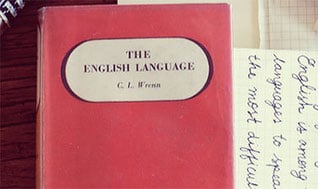
This course is designed to help students become skilled readers and writers through engagement with the following course requirements:
Composing in several forms (e.g., narrative, expository, analytical, and argumentative essays) about a variety of subjects
Writing that proceeds through several stages or drafts, with revision aided by teacher and peers
Writing informally (e.g., imitation exercises, journal keeping, collaborative writing), which helps students become aware of themselves as writers and the techniques employed by other writers
Read more
This course is designed to help students become skilled readers and writers through engagement with the following course requirements:
Composing in several forms (e.g., narrative, expository, analytical, and argumentative essays) about a variety of subjects
Writing that proceeds through several stages or drafts, with revision aided by teacher and peers
Writing informally (e.g., imitation exercises, journal keeping, collaborative writing), which helps students become aware of themselves as writers and the techniques employed by other writers
This course is designed to help students become skilled readers and writers through engagement with the following course requirements:
Composing in several forms (e.g., narrative, expository, analytical, and argumentative essays) about a variety of subjects
Writing that proceeds through several stages or drafts, with revision aided by teacher and peers
Writing informally (e.g., imitation exercises, journal keeping, collaborative writing), which helps students become aware of themselves as writers and the techniques employed by other writers
Writing expository, analytical, and argumentative compositions based on readings representing a variety of prose styles and genres
Reading nonfiction (e.g., essays, journalism, science writing, autobiographies, criticism)
Analyzing graphics and visual images both in relation to written texts and as alternative forms of text themselves
Developing research skills and the ability to evaluate, use, and cite primary and secondary sources
Conducting research and writing argument papers in which students present an argument of their own that includes the analysis and synthesis of ideas from an array of sources
Citing sources using a recognized editorial style (e.g., Modern Language Association, The Chicago Manual of Style)
Revising work to develop:
A wide-ranging vocabulary used appropriately and effectively;
A variety of sentence structures, including appropriate use of subordination and coordination;
Logical organization, enhanced by techniques such as repetition, transitions, and emphasis;
A balance of generalization and specific, illustrative detail; and
An effective use of rhetoric, including tone, voice, diction, and sentence structure.
Learn more about our High School and AP* Exam Preparation Courses
Advanced Placement and AP are registered trademarks of the College Board, which was not involved in the production of, and does not endorse, these offerings.
What you'll learn
- To analyze different types of texts
- To write for a variety of purposes
- To understand and employ rhetorical strategies
- To evaluate and incorporate sources into researched arguments
- To prepare for the AP English Composition exam
Good to know
Save this course
Activities
Career center
Technical Writer
Content Writer
Copywriter
Public Relations Specialist
Journalist
Editor
Speechwriter
Marketing Manager
Grant Writer
Policy Analyst
Lawyer
Teacher
Professor
Librarian
Archivist
Featured in The Course Notes



Reading list
Share
Similar courses
OpenCourser helps millions of learners each year. People visit us to learn workspace skills, ace their exams, and nurture their curiosity.
Our extensive catalog contains over 50,000 courses and twice as many books. Browse by search, by topic, or even by career interests. We'll match you to the right resources quickly.
Find this site helpful? Tell a friend about us.
We're supported by our community of learners. When you purchase or subscribe to courses and programs or purchase books, we may earn a commission from our partners.
Your purchases help us maintain our catalog and keep our servers humming without ads.
Thank you for supporting OpenCourser.


